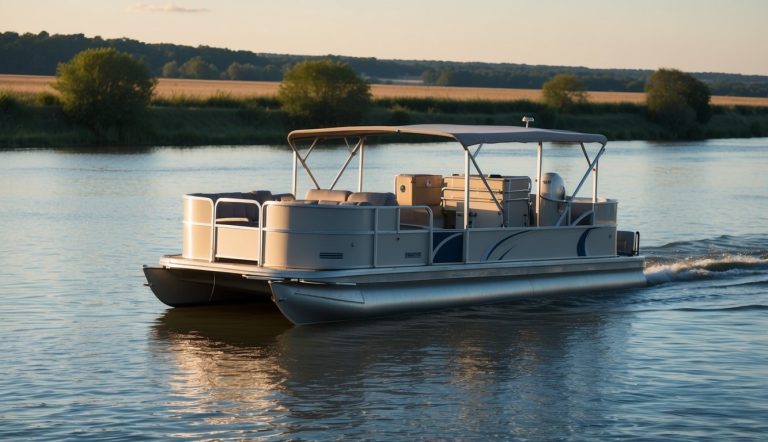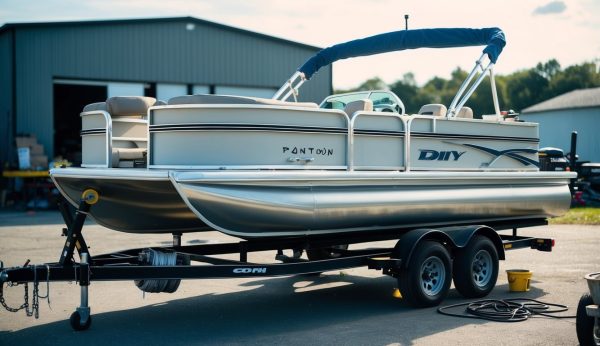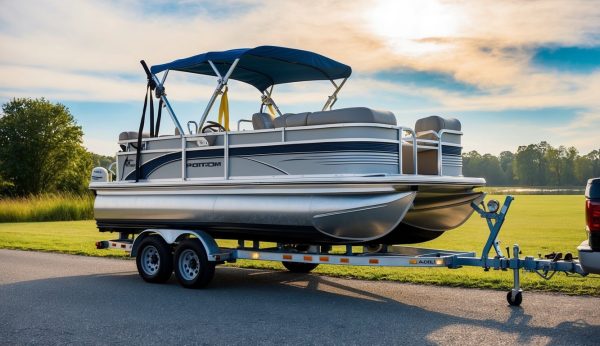Moving a pontoon boat requires special care and expertise. Whether you’re relocating to a new lake house or purchasing a boat from out of state, understanding your transport options saves time and prevents damage to your vessel.
Finding reliable pontoon boat transport services ensures your watercraft arrives safely at its destination. You have several shipping methods to consider, from hiring professional transporters to trailering it yourself. Each option offers different benefits depending on your budget, timeline, and the distance your boat needs to travel.
Trailering Techniques for Safety
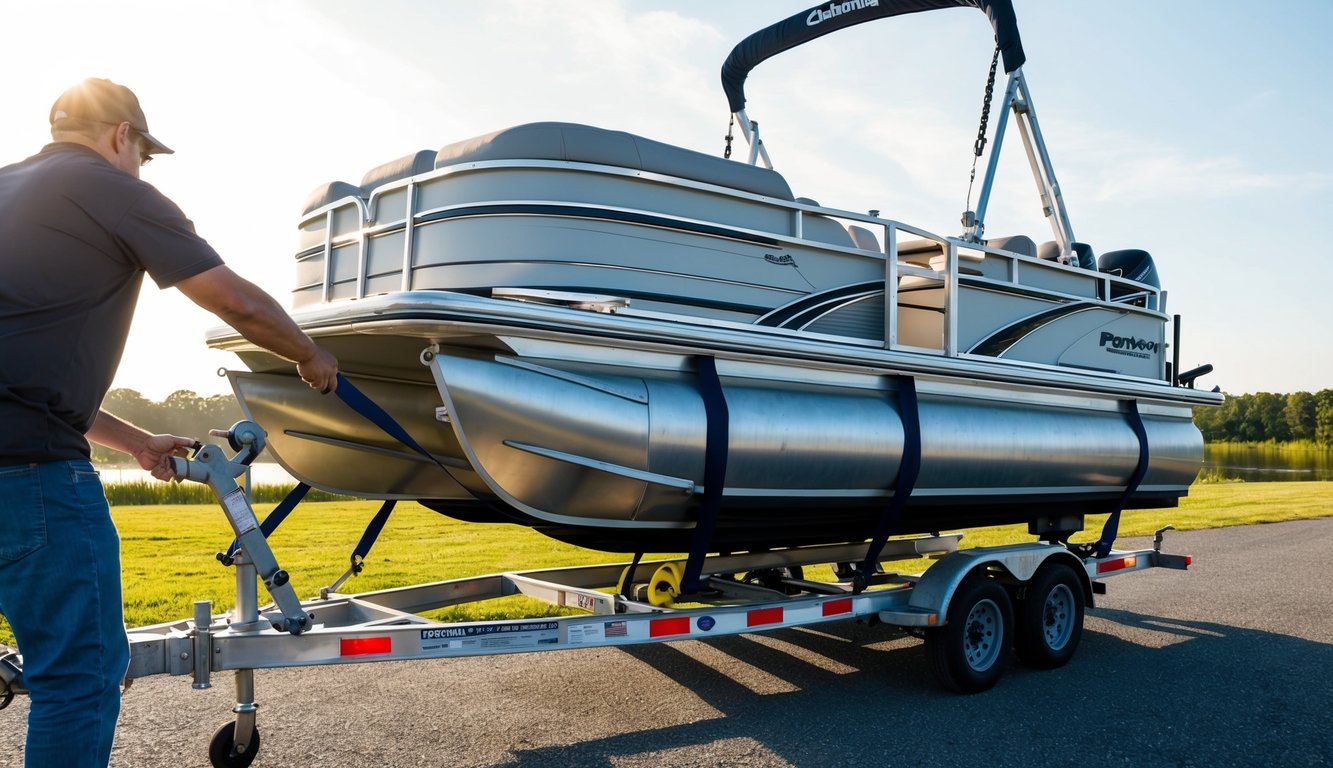
- When transporting your pontoon boat, safety should be your top priority. Make sure your boat is strapped down securely to prevent movement during travel, especially since pontoons catch a lot of wind.
- Before loading your pontoon, back the trailer into the water until just the forward ends of the bunks are visible. Turn off your vehicle and apply the hand brake for stability during loading, as recommended by Harris Boats.
- Pay attention to weight distribution on your trailer. You can adjust this by shifting gear inside the boat, emptying water tanks, or adjusting the boat’s position on the trailer to maintain proper tongue weight.
- While driving, avoid sudden movements such as quick lane changes or tight turns. Remember that your vehicle is now longer and wider with the attached trailer.
- Maintain a reasonable speed when trailering your pontoon. Higher speeds create more wind resistance and can make your trailer harder to control, especially on highways.
- Check your trailer connections frequently during long trips. This includes hitch connections, safety chains, and trailer lights to ensure everything remains secure.
Choosing the Right Trailer for Your Boat

- When transporting your pontoon boat, picking the right trailer is crucial for safety and convenience. You need to consider several key factors before making your decision.
- The size of your pontoon boat should match your trailer’s capacity. Load capacity is a critical factor—your trailer must support the weight of your boat, engine, and gear.
- There are two main trailer types to consider. Bunk trailers slide under the entire boat and work well for heavier boats with larger engines. They’re especially suitable for tritoons.
- Scissor pontoon trailers slide between the pontoon tubes, offering a different support structure. Your boat’s design will help determine which type works best.
- Material matters too. Most trailers are made from galvanized steel, which resists rust and corrosion—important for trailers regularly exposed to water.
- Don’t overlook safety features like proper lighting, secure tie-downs, and dependable brakes. Brake type (disc or electric) should be considered based on your towing vehicle and local regulations.
- With these considerations in mind, choosing the right trailer doesn’t have to be overwhelming. The proper trailer ensures your boat arrives safely at its destination.
Understanding Pontoon Boats Transport Services
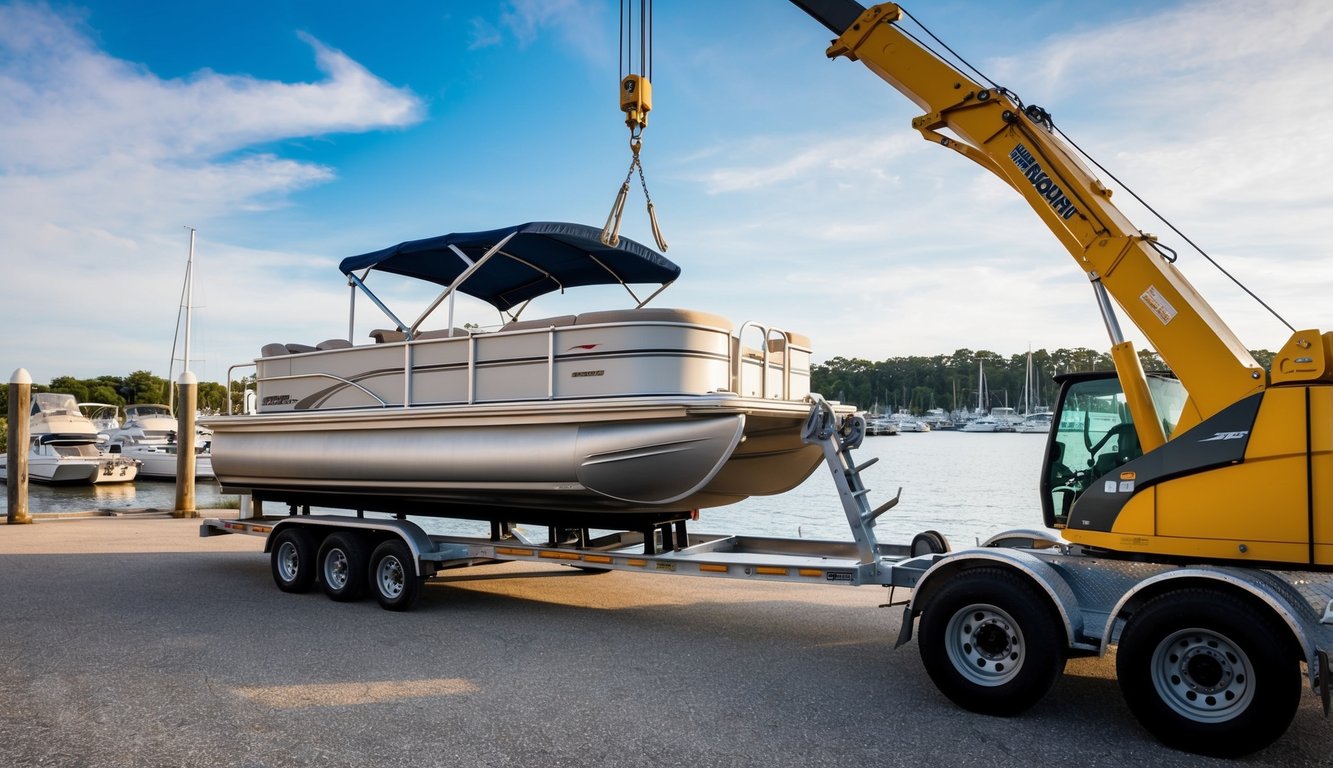
Moving a pontoon boat requires specialized knowledge and equipment to ensure safe delivery. Professional transport services offer solutions for both local and long-distance moves with specific methods tailored to these unique vessels.
What Are Pontoon Boats?
- Pontoon boats are flat-decked watercraft supported by two or three hollow aluminum tubes called pontoons. These boats typically range from 16 to 30 feet in length and can weigh between 2,000 to 5,000 pounds depending on size and features.
- Their distinctive design creates a wider, more stable platform than traditional V-hull boats, making them popular for leisure activities like fishing and family outings.
- The unique structure of pontoon boats presents specific challenges for transportation. Their width (often 8-10 feet) classifies many as wide loads on highways, requiring special permits and handling procedures.
- Unlike traditional boats, pontoons have a higher wind profile and different balance points that affect how they must be secured for transport.
Importance of Professional Transport
Professional transport services offer specialized equipment designed specifically for pontoon boats. They use custom-fitted trailers that properly support the pontoons and prevent damage during transit. Experienced transporters understand proper securing techniques for these boats, using specialized straps and supports to prevent shifting that could damage the aluminum tubes or deck structure.
Professional services handle all required permits and route planning for wide loads, which vary by state and can be complicated to navigate for individual owners. The cost of professional pontoon transport typically ranges from $1,500 to $5,000 for domestic shipping, depending on:
- Distance traveled
- Boat size and weight
- Urgency of delivery
- Season and current fuel prices
Local Transport Options
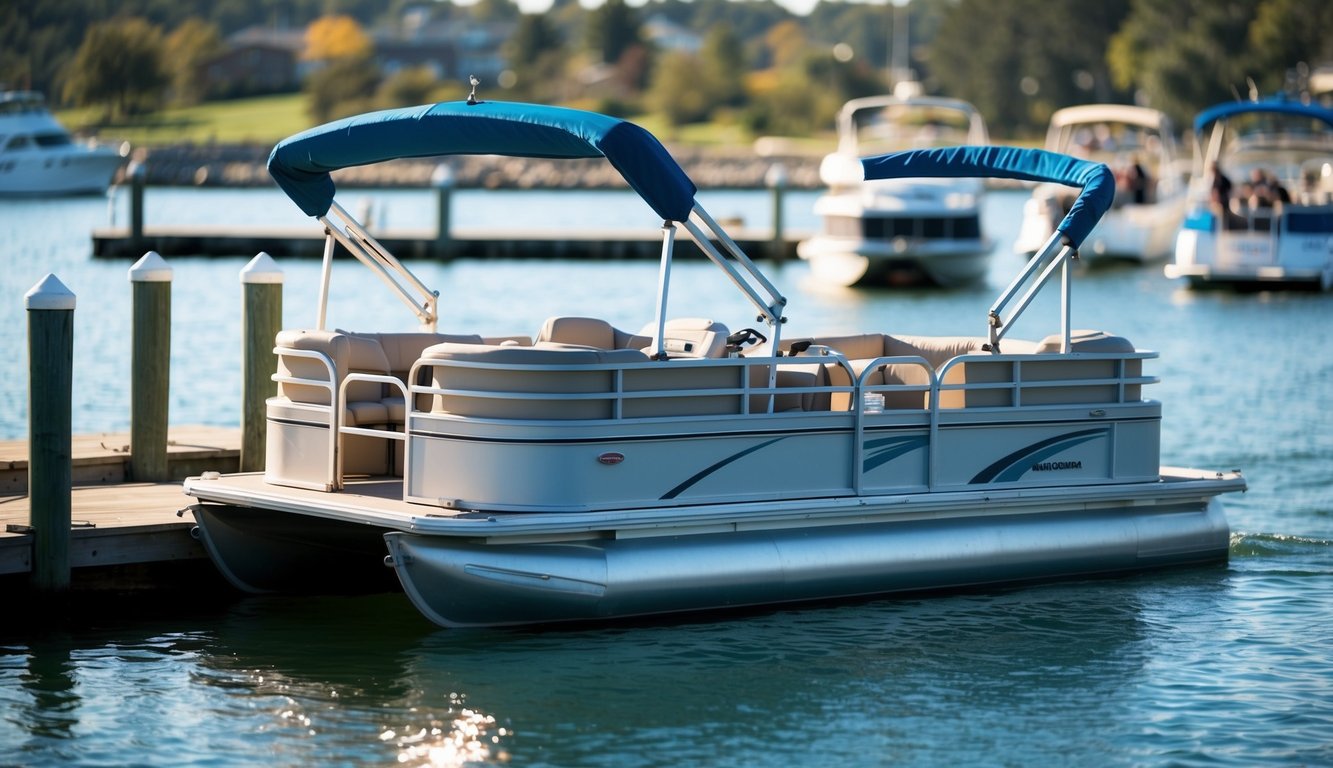
Moving your pontoon boat within your local area requires careful planning and the right service provider. Your choice will impact both the safety of your boat and your budget.
Choosing the Right Service Provider
- When selecting a local pontoon transport service, verify their credentials and insurance coverage. Ask potential companies about their experience with pontoon boats specifically, as these vessels require proper handling.
- Check online reviews and request references from past customers. A reputable boat transport company will have positive feedback and testimonials.
- Ensure the provider has the appropriate equipment for your boat size. They should use proper strapping techniques and protective coverings to prevent damage during transit.
- Request a detailed contract that outlines pickup and delivery times, liability coverage, and any additional services like loading or unloading assistance.
Cost Considerations for Local Transport
Local pontoon transport costs typically range from $1.50 to $4 per mile, depending on boat size and service level. Larger pontoons or those requiring special handling will be at the higher end of this range.
Additional factors affecting price include:
- Accessibility: Difficult pickup or delivery locations may incur surcharges
- Timing: Rush services usually cost more
- Season: Peak boating seasons may have higher rates
- Boat preparation: Services that include shrink-wrapping or other prep work cost extra
Many companies require a deposit, typically 25-50% of the total cost. Ask about payment methods and when final payment is due. Boat transport services in Texas and other states may have different pricing structures based on local regulations and market conditions. Always get multiple quotes to compare services and prices.
Long-Distance Transport Solutions
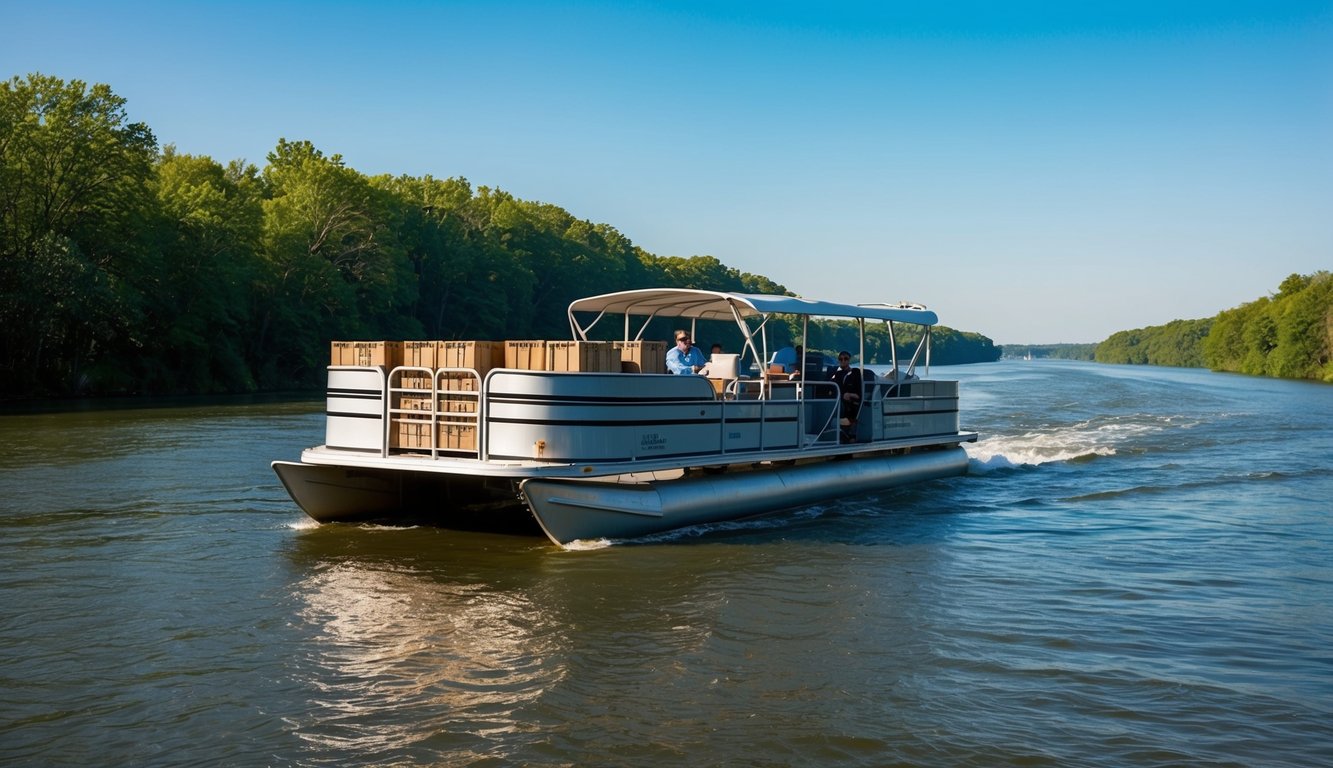
Moving pontoon boats across state lines or across the country requires specialized planning and care. Professional transporters offer various options to ensure your boat arrives safely at its destination.
Planning for Long-Distance Moves
When preparing for long-distance pontoon boat transport, timing is crucial. Book your transport at least 2-3 weeks in advance, especially during peak seasons (spring and fall). Nationwide boat transport companies typically offer free quotes based on:
- Distance traveled
- Boat dimensions and weight
- Pickup and delivery locations
- Timeline requirements
You’ll need to provide accurate measurements of your pontoon boat, including length, width, height, and weight. Most transporters require you to remove personal items and secure loose components before transport. Insurance coverage is essential for long-distance moves. Verify that the transport company offers adequate insurance protection. Request documentation of coverage limits and consider supplemental insurance for high-value boats.
Ensuring Safe and Efficient Transportation
Professional boat transport services use specialized equipment designed specifically for pontoon boats. These include custom trailers with proper support points to prevent hull damage during transit.
For cross-country transport, carriers use:
- Air-ride trailers to minimize vibration
- Secure strapping systems to prevent shifting
- Protective coverings to shield against road debris and weather
Tracking capabilities offer peace of mind during long journeys. Many pontoon boat transport companies provide real-time GPS updates so you can monitor your boat’s progress. For routes crossing multiple climate zones, ask about special precautions. Professional haulers know how to protect your boat from temperature changes, road salt, and other environmental factors that might cause damage during long-distance travel.
